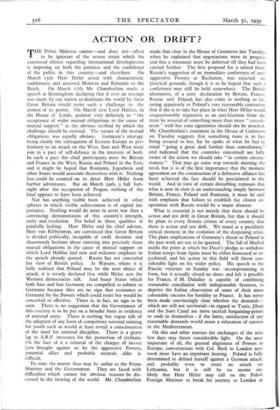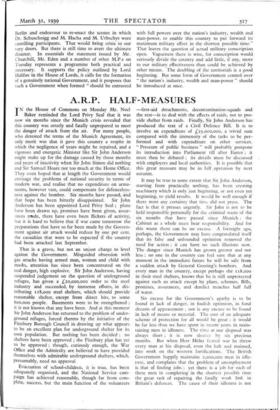ACTION OR DRIFT ?
THE Prime Minister cannot—and does not—affect to be ignorant of the severe strain which his continued silence regarding international developments is imposing on both the patience and the confidence of the public in this country—and elsewhere. On March 15th Herr Hitler acted with characteristic suddenness and annexed Moravia and Bohemia to the Reich. On March 17th Mr. Chamberlain made a speech at Birmingham declaring that if ever an attempt was made by any nation to dominate the world by force Great Britain would resist such a challenge to the utmost of its power. On March 21st Lord Halifax, in the House of Lords, pointed very definitely to " the acceptance of wider mutual obligations in the cause of mutual support " as the obvious method by which the challenge should be resisted. The nature of the mutual obligations was equally obvious. Germany's strategy being clearly the subjugation of Eastern Europe as pre- liminary to an attack on the West, East and West must join in a pact of self-defence in the interests of both. In such a pact the chief participants must be Britain and France in the West, Russia and Poland in the East, and it might be hoped that Rumania, Jugoslavia and other States would associate themselves with it. Nothing less could be counted on to deter Herr Hitler from further adventures. But on March 29th, a full fort- night after the occupation of Prague, nothing of the kind appears to have been achieved.
Nor has anything visible been achieved in other spheres in which visible achievement is of capital im- portance. Nothing would do more to avert war than a convincing demonstration of this country's strength, unity and resolution. For belief in those qualities is painfully lacking. Herr Hitler and his chief adviser, Herr von Ribbentrop, are convinced that Great Britain is divided politically, incapable of swift decision and disastrously hesitant about entering into precisely those mutual obligations in the cause of mutual support on which Lord Halifax laid new and welcome emphasis in the speech already quoted. Russia has not concealed her view of British policy. At Warsaw, where it is fully realised that Poland may be the next object of attack, it is tersely declared that while Hitler acts the Western democracies talk. And lesser States which both hate and fear Germany are compelled to submit to Germany because they see no sign that resistance to Germany by the Powers which could resist her would be concerted or effective. There is, in fact, no sign to be seen. There is no suggestion that the Government of this country is to be put on a broader basis as evidence of national unity. There is nothing but vague talk of the adoption of any form of compulsory national training for youth such as would at least reveal a consciousness of the need for national discipline. There is a grave lag in A.R.P. measures for the protection of civilians. On the face of it a rebuttal of the charges of laissez faire brought against us by the aggressive Powers, potential allies and probable neutrals alike is difficult.
To state the matter thus may be unfair to the Prime Minister and the Government. They are faced with difficulties which cannot for obvious reasons be dis- cussed in the hearing of the world. Mr. Chamberlain made that clear in the House of Commons last Tuesday, when he explained that negotiations were in progress and that a statement must be deferred till they had been carried further. The first proposal for a united front, Russia's suggestion of an immediate conference of anti- aggressive Powers at Bucharest, was rejected on. practical grounds, though it is to be hoped that such a conference may still be held somewhere. The British alternative, of a joint declaration by Britain, France, Russia and Poland, has also come to nothing so far, owing apparently to Poland's very reasonable contention that if she is to take her place in what Herr Hitler would unquestionably stigmatise as an anti-German front she must be assured of something more than mere " consult- ' ation " with her joint signatories should she be attacked. Mr. Chamberlain's statement in the House of Commons on Tuesday suggests that something more is in fact being assured to her, for he spoke of what he had in mind " going a great deal further than consultation," and indicated that the countries concerned are fully aware of the action we should take " in certain circum- stances." That may go some way towards meeting the need, but it is of the first importance that the moment agreement on the construction of a defensive alliance has been achieved the fact should be proclaimed to the world. And in view of certain disturbing rumours that what is now in view is an understanding simply between Britain, France, Poland and Rumania, it must be said with emphasis that failure to establish the closest co- operation with Russia would be a major disaster.
What is essential is not merely that there should be action and not drift in Great Britain, but that it should be plain to every literate citizen of every country that there is action and not drift. We stand at a peculiarly critical moment in the evolution of the deepening crisis. The plain implications of Germany's threat to Poland in the past week are not to be ignored. The fall of Madrid marks the point at which the Duce's pledge to withdraw Italian troops from Spain must be either honoured or re- pudiated, and his action in this field' will throw con- siderable light on his wider policy. His speech to the Fascist veterans on Sunday was uncompromising in form, but it actually closed no doors and left it possible for France, if M. Daladier is capable of combining reasonable conciliation with indispensable firmness, to deprive the Italian chauvinists of some of their more colourable excuses for hostility to France. It has never been made convincingly clear whether the demands— which are still not territorial—in regard to Tunis, Jibuti and the Suez Canal are mere tactical bargaining-points or ends in themselves ; if the latter, satisfaction of any reasonable demands would mean a relaxation of tension in the Mediterranean.
On this and other matters the exchanges of the next few days may throw considerable light. On the most important of all, the general alignment of Powers in Europe, conversations with Col. Beck in London next week must have an important bearing. Poland is fully determined to defend herself against a German attack. and probably even to resist an attack on Lithuania, but it is still by no means un- likely that Herr Hitler may call on the Polish Foreign Minister to break his journey to London at Berlin and endeavour to re-enact the scenes in which Dr. Schuschnigg and M. Hacha and M. Urbschys were unwilling participants. That would bring crisis to our very doors. But there is still time to avert the ultimate disaster. In essentials the statement issued by Mr. Churchill, Mr. Eden and a number of other M.P.s on Tuesday represents a programme both practical and necessary. It supports the policy outlined by Lord Halifax in the House of Lords, it calls for the formation of a genuinely national Government, and it proposes that such a Government when formed " should be entrusted with full powers over the nation's industry, wealth and man-power, to enable this country to put forward its maximum military effort in the shortest possible time." That leaves the question of actual military conscription open. Vagueness there is wise, for conscription would seriously divide the country and add little, if any, more to our military effectiveness than could be achieved by other means. The doubling of the territorials is a good beginning. But some form of Government control over the nation's industry, wealth and man-power " should be introduced at once.



































































 Previous page
Previous page